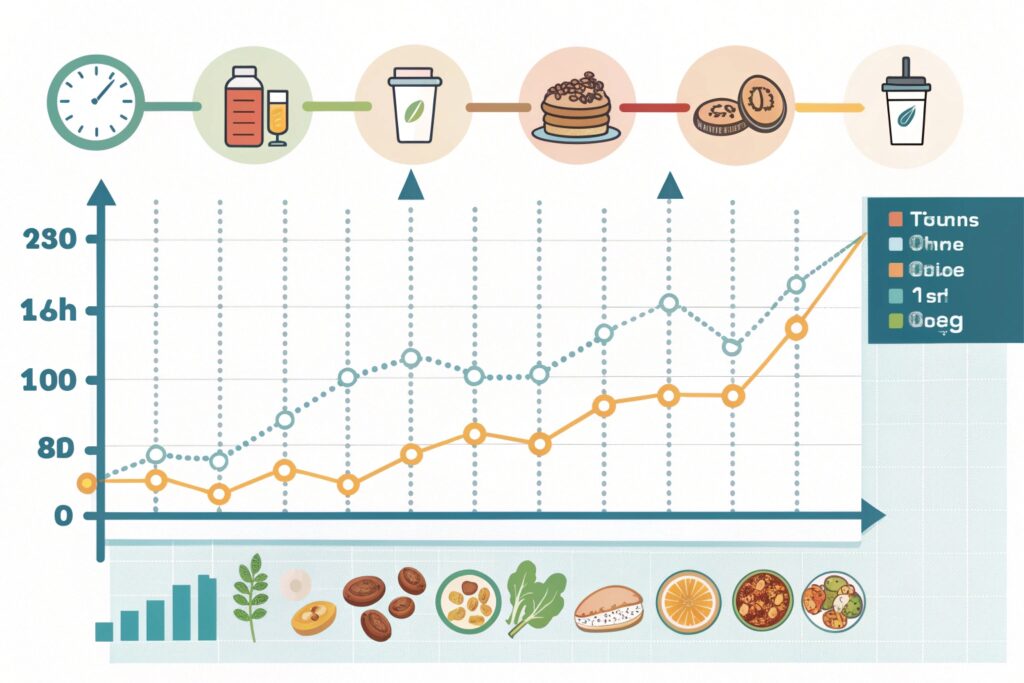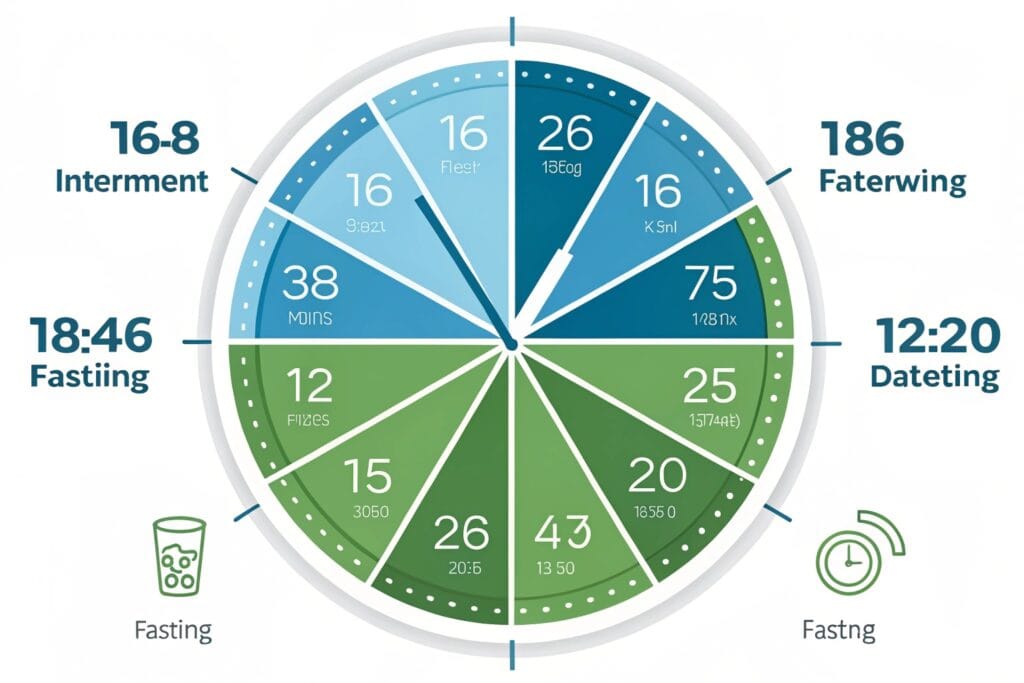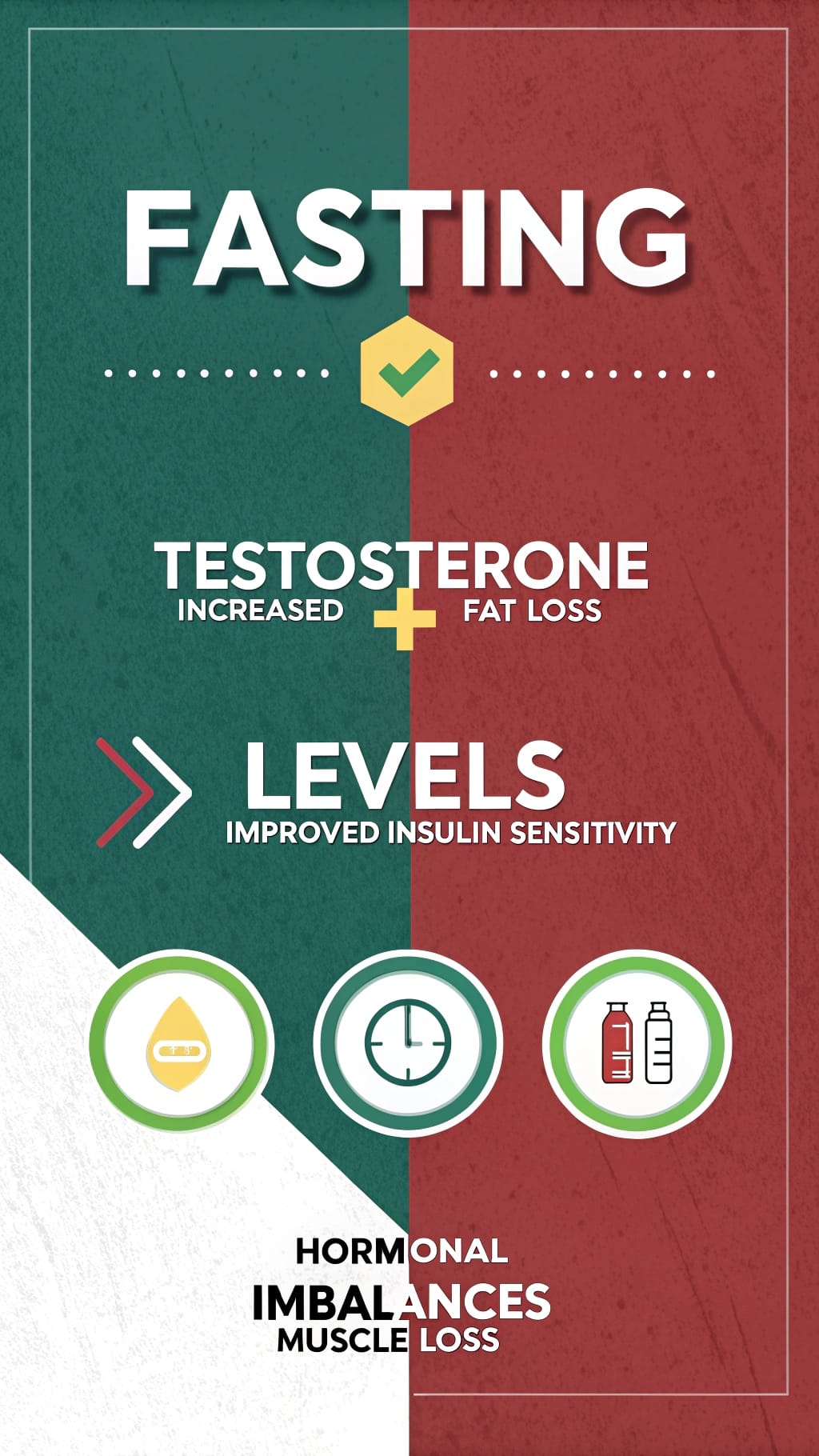Does Fasting Increase Testosterone? The Surprising Truth 2025
Intermittent Fasting is Hot – But Does it Help or Hurt Your T Levels?
Intermittent fasting has exploded in popularity over the past few years, with millions adopting various fasting protocols for weight loss, improved metabolic health, cellular cleanup (autophagy), and numerous other touted benefits. If you’re following a carnivore or keto lifestyle, chances are you’ve either tried or considered incorporating some form of fasting into your routine.
But for men concerned about optimizing their hormonal health, a critical question remains: does fasting increase testosterone, or could it potentially be tanking your T levels?
Table of Contents
The Short Answer: It’s Complicated (and Depends!)
If you’re looking for a simple yes or no answer, I hate to disappoint you – but the relationship between fasting and testosterone isn’t straightforward. Short-term effects can differ significantly from long-term benefits, and individual factors like your current health status, body composition, and fasting approach all play major roles.

What This Post Will Uncover:
- The key hormonal shifts that occur during fasting periods
- What scientific research actually shows about short-term versus longer fasts and testosterone levels
- How intermittent fasting might indirectly benefit testosterone production long-term (through fat loss and improved insulin sensitivity)
- Practical takeaways for men using intermittent fasting while wanting to maintain or boost testosterone
Disclaimer: This article is for informational purposes only and does not constitute medical advice. Please consult with your healthcare provider before starting any fasting protocol, especially if you have concerns about hormonal health.
Your Body on Empty: Key Hormonal Changes During a Fast
When you stop eating for an extended period, your body undergoes a cascade of hormonal adaptations designed to keep you functioning optimally while searching for food. Understanding these changes helps clarify how fasting might impact testosterone.
Insulin Levels Plummet:
The most immediate and significant hormonal shift during fasting is the drop in insulin. As your body depletes stored glucose, insulin levels decline sharply – which is actually a primary goal of fasting for metabolic health.
Why this matters for testosterone: Chronically elevated insulin (insulin resistance) is strongly associated with reduced testosterone production. Research published in Clinical Endocrinology confirmed that insulin resistance is independently associated with lower testosterone levels in men. By regularly lowering insulin through fasting, you create a more favorable hormonal environment for testosterone synthesis.
If you’re concerned about insulin levels, check out our guide on normal insulin levels for women (men have similar optimal ranges).
Growth Hormone (GH) Spikes:
Research shows that fasting triggers significant increases in growth hormone secretion. During a 24-hour fast, GH levels can increase by 1300-2000% in men, according to a landmark study in the Journal of Clinical Investigation. This hormone surge helps preserve muscle mass while promoting fat burning during food restriction.
Growth hormone and testosterone share some complementary functions, particularly regarding muscle preservation and recovery. This is especially important if you’re combining fasting with weight training on keto.
Luteinizing Hormone (LH) – The Testosterone Precursor:
This is where the direct impact on testosterone gets interesting. Luteinizing hormone, produced by the pituitary gland, signals the testes to produce testosterone. Any discussion about fasting’s direct effect on testosterone must examine what happens to LH during food restriction.

Does Skipping Breakfast Boost Your T? Short-Term Fasting Studies
What Research Shows About LH and Testosterone During Shorter Fasts:
The good news for intermittent fasting enthusiasts is that most studies examining common IF protocols (like 16/8 or even 24-hour fasts) show little to no significant negative impact on LH or total testosterone levels in healthy men.
Some research even indicates that shorter fasting periods might actually increase LH pulse frequency, which could theoretically support testosterone production. A study published in the Journal of Clinical Endocrinology and Metabolism found that short-term fasting in healthy men didn’t significantly reduce testosterone levels, despite changes in other metabolic hormones.
For those looking to incorporate intermittent fasting into their routine, our 16/8 intermittent fasting 7-day meal plan provides a structured approach compatible with hormone optimization.
Key Takeaway: Standard intermittent fasting approaches like 16/8 (16 hours fasting, 8 hours eating) or occasional 24-hour fasts don’t appear to lower testosterone levels directly in the short term for most healthy men.
Going Longer: What Happens to Testosterone During Extended Fasts?
Potential for Temporary Reduction:
The picture changes somewhat when we look at prolonged fasting (multiple days) or severe caloric restriction over extended periods. During these more extreme approaches, the body prioritizes survival over reproductive function, potentially leading to decreased LH pulse amplitude and frequency.
This survival mechanism makes evolutionary sense – when food is extremely scarce, reproduction becomes a lower priority than immediate survival. This can manifest as a temporary decrease in testosterone production.
A study examining men during a 10-day fast found modest decreases in total testosterone by the end of the fasting period, though values generally remained within normal physiological ranges.
Context Matters: Refeeding & Recovery
The important nuance here is that hormone levels typically return to normal (or potentially even higher baseline due to improved metabolic health) after refeeding resumes. The temporary dip during prolonged fasting doesn’t necessarily translate to chronic low testosterone.
Caution: Extended fasting protocols lasting multiple days require careful consideration and often medical supervision, particularly for those with existing health conditions. If you’re experiencing sugar cravings during ketosis, this could be a sign to reconsider your fasting approach.
Beyond Direct Effects: The Powerful Indirect Ways Fasting Supports Healthy Testosterone
While the direct short-term effects of fasting on testosterone might be neutral or slightly negative (in extended fasts), the indirect long-term benefits could significantly support healthy testosterone levels through several mechanisms:
1. Improved Insulin Sensitivity:
Chronic high insulin is consistently linked to lower testosterone levels in men. A comprehensive review in Diabetology & Metabolic Syndrome confirmed this relationship. One of fasting’s most powerful benefits is drastically improving insulin sensitivity, creating a better hormonal environment for testosterone production over time.
For men following a carnivore or ketogenic diet, combining these approaches with intermittent fasting can create a powerful synergy for insulin management – the diet keeps insulin consistently low, while periodic fasting enhances sensitivity even further.
2. Fat Loss (Especially Belly Fat):
Excess body fat, particularly visceral fat carried around the abdomen, contains high levels of the enzyme aromatase, which converts testosterone to estrogen. This can lead to a double whammy of hormonal challenges: lower testosterone AND higher estrogen.
Intermittent fasting, especially when combined with a carnivore or keto approach, can be extremely effective for reducing body fat. By shedding excess weight, particularly around the midsection, you may naturally preserve more of your testosterone.
If you’re specifically looking to lose face fat, which can be an indicator of higher overall body fat, check out our guide on how to lose face fat.
3. Reduced Inflammation:
Chronic inflammation can negatively impact the entire endocrine system, including testosterone production. Multiple studies, including research published in Nature Reviews Endocrinology, have demonstrated the potent anti-inflammatory effects of fasting, which may create a more favorable environment for optimal hormonal function.
The carnivore diet is also known for its inflammation-reducing properties, making it a complementary approach to intermittent fasting for men concerned about testosterone levels.
4. Potential Autophagy Benefits:
During fasting, your body initiates a cellular cleanup process called autophagy, where damaged cell components are recycled. While direct research linking autophagy to testosterone production is limited, this cellular renewal process may contribute to overall endocrine system health and function.
To learn more about autophagy timing and benefits, check out our detailed guide: When Does Autophagy Start?
Implementing IF Wisely for Hormonal Health
Based on the available research and understanding of hormonal mechanisms, here are practical strategies for implementing intermittent fasting while supporting testosterone levels:
Focus on Common IF Protocols:
For most men, standard intermittent fasting approaches like 16/8, 18/6, or occasional 24-hour fasts seem safe and potentially beneficial for long-term hormonal health when implemented correctly.
More extreme approaches like multiple-day fasting should be approached with caution, especially for those specifically concerned about testosterone optimization.

Combine with a Nutrient-Dense Diet:
Fasting alone isn’t enough – your body needs the raw materials to produce testosterone during feeding windows. A carnivore or ketogenic diet provides many of the foundational building blocks needed:
- Dietary cholesterol: The precursor to all steroid hormones, including testosterone
- Saturated fat: Associated with higher testosterone levels in some studies
- Zinc: Critical mineral for testosterone production (abundant in red meat)
- Magnesium: Essential for hundreds of enzymatic processes, including hormonal regulation. Check out our guide on keto magnesium deficiency
- Vitamin D: Functions more like a hormone than a vitamin and supports testosterone synthesis
For more on key nutrients for hormonal health on a carnivore diet, check out our guide: Carnivore Diet Electrolytes
Prioritize Sleep & Stress Management:
These factors heavily impact testosterone levels regardless of your fasting regimen. A study in the Journal of the American Medical Association found that just one week of sleep restriction reduced testosterone levels in healthy young men by 10-15%. Poor sleep and chronic stress can negate many of the potential testosterone benefits of fasting, while good sleep quality and stress management enhance them.
For stress management resources, see our guide on stress management techniques.
Listen to Your Body:
Pay attention to warning signs that might indicate your fasting approach isn’t working for your hormonal health:
- Significant fatigue or energy crashes
- Decreased libido or sexual function
- Reduced motivation or drive
- Difficulty recovering from workouts
- Mood disturbances
If you experience these symptoms while fasting, consider adjusting your approach – either shortening fasting windows, increasing caloric intake during feeding periods, or taking periodic breaks from fasting. These symptoms can sometimes overlap with keto flu, so distinguishing between adaptation issues and hormonal concerns is important.
Don’t Confuse Short-Term Fluctuation with Long-Term Trends
Testosterone levels naturally fluctuate throughout the day, week, and season. A single testosterone measurement during or after a fast doesn’t provide the complete picture of your hormonal health. Focus on consistent implementation of healthy habits and monitor trends over time.
Frequently Asked Questions About Fasting and Testosterone
Will 16/8 intermittent fasting lower testosterone?
Research suggests that standard 16/8 intermittent fasting protocols are unlikely to lower testosterone levels in healthy men. In fact, the long-term metabolic benefits of this fasting approach may indirectly support optimal testosterone production through improved insulin sensitivity and reduced body fat.
Does fasting increase testosterone in women?
Fasting affects women’s hormones differently than men’s. Women’s bodies are more sensitive to energy restriction signals, and overly aggressive fasting may disrupt hormonal balance. For women, shorter fasting windows (12-14 hours) might be more appropriate, and the focus should be on metabolic health rather than testosterone optimization specifically.
How long does it take for fasting to affect hormone levels?
Short-term hormonal adaptations to fasting begin within hours (insulin reduction, growth hormone increase), but meaningful changes to sex hormones like testosterone typically take longer to manifest. The indirect benefits of fasting on testosterone through improved metabolic health may take weeks or months of consistent practice to fully develop.
Can fasting help with low testosterone?
If low testosterone is related to insulin resistance, excess body fat, or chronic inflammation, then strategic fasting combined with a nutrient-dense diet may help address these root causes. However, fasting is not a direct treatment for clinically diagnosed hypogonadism, which requires medical supervision.
Should I take supplements while fasting to support testosterone?
Most supplements should be taken during eating windows rather than during fasting periods. Critical nutrients for testosterone production include zinc, magnesium, vitamin D, and vitamin K2, which are best absorbed with food. For more information, see our guide on carnivore diet supplements.
The Verdict on Fasting and Testosterone
After examining the available evidence, we can conclude that standard intermittent fasting approaches likely do not negatively impact testosterone levels in healthy men over the short term. More importantly, the indirect benefits of regular intermittent fasting – improved insulin sensitivity, reduced body fat, decreased inflammation, and cellular cleanup – may significantly contribute to optimized testosterone production over the long term.
Very long fasts might cause temporary dips in testosterone, but these typically normalize after refeeding and don’t appear to cause lasting hormonal disruption in otherwise healthy individuals.
Focus on the Big Picture: Sustainable Health Habits
For optimal hormonal health, the most effective approach combines strategic intermittent fasting with a nutrient-dense carnivore or ketogenic diet, quality sleep, effective stress management, and appropriate physical activity.
Remember that hormonal health is a long game – consistency with sustainable practices over months and years will yield far better results than extreme approaches that can’t be maintained.
Final Disclaimer: Always consult your healthcare provider before starting or changing fasting protocols, especially if you have pre-existing health conditions or hormonal concerns.
Do you practice Intermittent Fasting? Have you noticed any effects on your energy, motivation, or other markers that might relate to testosterone? Share your experience in the comments below!
Want to learn more about combining Intermittent Fasting with a Carnivore or Keto approach? Check out our comprehensive guide: Carnivore Diet and Intermittent Fasting
Discover the full spectrum of benefits that ketosis offers beyond hormonal health: Advantages of Ketosis
Enjoy, Review – We Value Your Opinion!
There are no reviews yet. Be the first one to write one.

